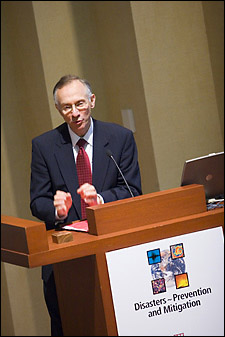Fineberg raps disaster preparation for lacking social aspect
Former provost speaks at disaster prevention conference
Former Provost Harvey Fineberg said April 26 that preparations for future disasters have to involve private citizens as well as governments in order to be effective.
“It’s never going to be sufficient if it is just government that is doing it, even if it’s government at all levels,” Fineberg said. “It requires much more extensive social preparation than we’ve begun to do.”
Also in this issue:
White House’s Townsend
talks bird flu
Fineberg said people are not currently preparing quickly enough to face the potential disasters that are facing us. He acknowledged the difficulty in sustaining disaster preparations when disasters are by nature infrequent events. He warned against people who downplay danger and belittle preparation efforts, saying that until a disaster strikes, they’ll appear to be correct.
“We need a willingness to prepare, which is difficult to sustain without an imminent threat,” Fineberg said. “We have a big challenge.”
It is important to create a “portfolio of preparedness” that readies us to respond to simultaneous disasters and to think about the overlap in responses needed for both natural and man-made disasters, such as terrorist strikes, he said.
Fineberg was a keynote speaker at a three-day conference hosted by the Harvard School of Public Health (HSPH) on preparations for natural and man-made calamities. The conference, “Disasters: Prevention and Mitigation,” was held at the American Academy of Arts and Sciences in Cambridge.
Joseph Brain, conference co-chair and professor of environmental physiology at HSPH, pointed out that the conference opened on the 20th anniversary of the nuclear disaster at the Chernobyl nuclear power plant in Ukraine. Further, he said, headlines warning of the dangers of bird flu highlight the need to think seriously about how to prepare for calamities that strike without warning.
HSPH Dean Barry Bloom said the conference was a working session intended to produce concrete recommendations. The focus, he said, was on long-term planning, regulations, and preparations that would enable society to better handle a sudden disaster, rather than the minute-to-minute response to problems in the news today.

“We’re not dealing with the crisis of the week, but asking a bigger set of questions,” Bloom said. “There is knowledge, both here and elsewhere, but we have to mobilize that knowledge.”
The conference presented three days of working sessions, speeches, and panel discussions. Topics covered included leadership, economics, infrastructure, policy, emerging technology, natural disasters, and disease epidemics. Sponsors included the School of Public Health, the Harvard Center for the Environment, the Harvard Center for Risk Analysis, the Harvard-Cyprus Initiative for the Environment and Public Health, The Harvard NIEHS Center for Environmental Health, and a dozen other businesses and organizations.
Fineberg, currently president of The National Academies’ Institute of Medicine, said the time is ripe for the conference’s recommendations to have a positive effect. Timing is as important as a report’s excellence in whether its recommendations are embraced or fall on deaf ears. There is a national interest in disaster preparedness right now that makes people in power receptive to new suggestions, he said.
When planning for a future disaster, coming changes to the world have to be taken into consideration, Fineberg said.
With most of the world’s population growth between now and 2030 projected for urban areas in developing nations, Fineberg said those areas will have a new vulnerability to disaster. Technology will make communications and disaster response more rapid, but the increasingly interconnected world will break down natural and geographic barriers that, in an earlier time, may have bottled up biological dangers such as new diseases.
Similarly, he said, the increasing global wealth has pluses and minuses, because the disparity between the haves and have-nots creates a large vulnerable population even as it creates a pool of people and nations with resources to help during an emergency.
“All factors are moving us to be more vulnerable and to increase our resiliency,” Fineberg said.




